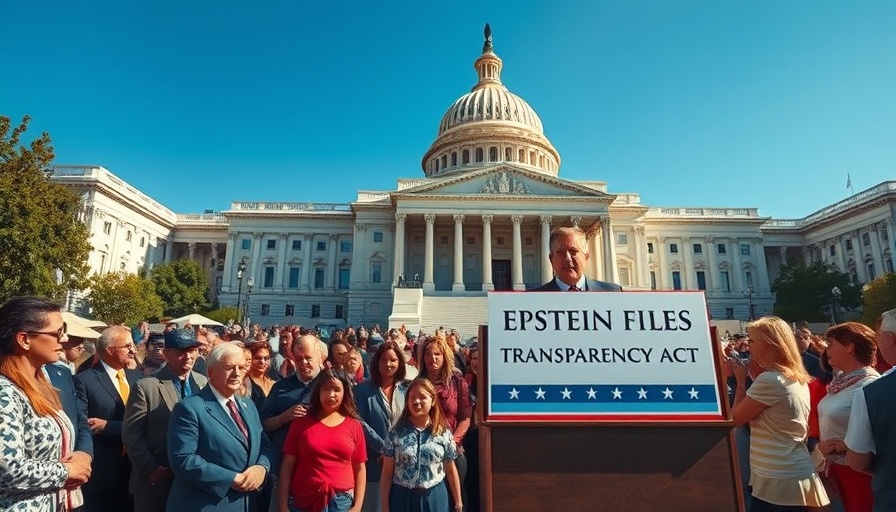
Demanding Justice: Epstein Survivors Speak Out
In an intense press conference that captured national attention, survivors of Jeffrey Epstein’s abuse joined forces with lawmakers to demand transparency and the release of all files related to the notorious financier. The call comes after an internal review by the Justice Department declared there was no definitive "client list" linking Epstein to several high-profile individuals, which has only fueled speculation and debate regarding the secrets that still linger.
What Lies Hidden in the Files?
Survivors, such as Lisa Phillips, expressed their frustrations during the conference. Phillips mentioned their intentions to compile their own list of individuals associated with Epstein, insinuating that many of them were aware of the abuse. This was met with both concern and fascination; the prospect of uncovering potential co-conspirators held strong implications for how the broader community views accountability for past actions.
The Political Implications
Notably, bipartisan support emerged during this press conference. Reps. Ro Khanna, Thomas Massie, and Marjorie Taylor Greene brought their diverse political backgrounds under one roof to push for a vote that could potentially change the narrative surrounding Epstein's connections. The divergence in rhetoric, particularly President Trump’s dismissive characterization of the survivor's call as a "Democrat hoax," exemplifies the political polarization surrounding this sensitive topic.
Historical Context: The Epstein Case
Critical Lessons About Power and Abuse
The saga of Jeffrey Epstein has exposed the darker side of power and privilege in America, unraveling shocking truths about systemic abuse. For many survivors, the need for transparency in Epstein's case extends beyond individual accountability; it calls for a reevaluation of how society handles allegations of sexual abuse among the elite. This pressing issue resonates deeply within the MeToo movement, bridging a gap between survivors and justice. As new details emerge, it is crucial to recognize the widespread implications of this case on legislative reform and public policy.
Emotional Impact on Survivors: Finding Their Voices
The victims' assertion that "we matter now" symbolizes a powerful reclamation of space. Survivors are increasingly vocal, demanding to be recognized not just as victims, but as resilient advocates for change. Their courage is inspiring others who have faced similar struggles to step forward, challenging a culture of silence that too long surrounded sexual abuse. This emotional aspect of their journey reflects a larger quest for empowerment, echoing the sentiments of many who search for closure and accountability.
Potential Outcomes of the Transparency Movement
The push for files to be released symbolizes more than just exposing names; it reflects a desire for justice. If the Justice Department is mandated to release Epstein’s files, revelations could redefine the public's understanding of accountability regarding sexual abuse in high-powered circles. Each document unearthed could shed light on the mechanics of exploitation and abuse, potentially leading to broader legal repercussions for those involved.
This call for transparency resonates with Commonsense Americans who believe that powerful individuals should not operate above the law. By fostering discussions around survivors’ experiences and what led to this significant moment, advocates hope the movement can not only promote healing but also reshape the justice system to better support victims.
The path toward transparency is fraught with complexities and challenges, and the political landscape adds another layer to the struggle. As voters express growing concern over the handling of such allegations, the outcome of this legislative push could have lasting ramifications for not just Epstein's case but for survivors everywhere.
A Call to Pay Attention
What You Can Do
As this situation continues to unfold, it is essential to stay informed and engaged. Survivors are calling for our attention — they are not just names in a story but individuals whose lives were irrevocably altered. Supporting movements that champion survivors and demanding accountability within our legal system can usher in significant and necessary change.
In conclusion, Epstein's legacy challenges us to evaluate both the systems that protect and those that silence. By listening to survivors and amplifying their call for transparency, we take a critical step toward a more just society.
 Add Row
Add Row  Add
Add 




Write A Comment